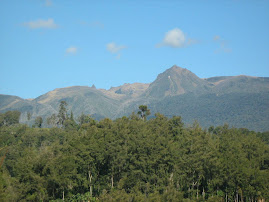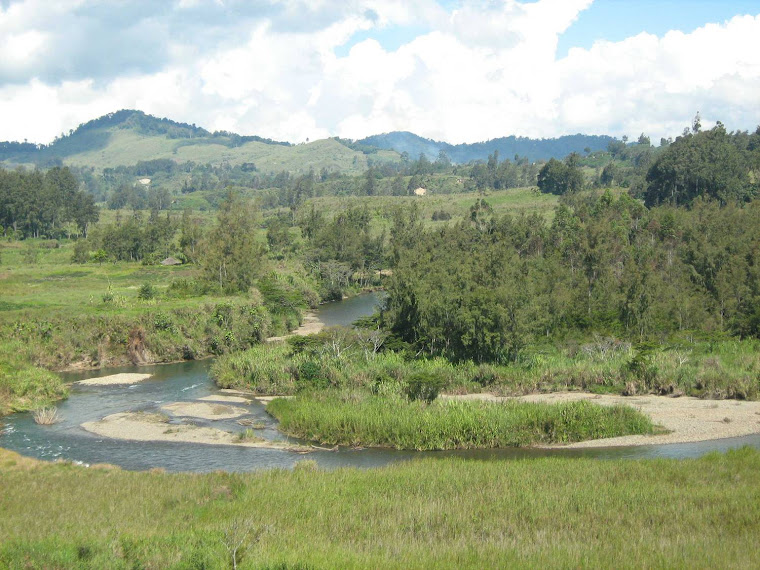 Caption: John Bria, the supposed masters student at Jilin University in China and the writer in the writers room at Friendship Hotel, Changchun, Jilin Province, China. The picture was taken a night before John left for Port Moresby the next day, Wednesday 17th Sep, 2009, after three weeks in Changchun. The Foreign Affairs, Trade and Immigration Department recalled him. Picture by Michael from Ethopia.
Caption: John Bria, the supposed masters student at Jilin University in China and the writer in the writers room at Friendship Hotel, Changchun, Jilin Province, China. The picture was taken a night before John left for Port Moresby the next day, Wednesday 17th Sep, 2009, after three weeks in Changchun. The Foreign Affairs, Trade and Immigration Department recalled him. Picture by Michael from Ethopia.Is PNG serious with China?
By Mathew Yakai in Changchun, China
GOVERNOR General Sir Paulias Matane’s recent independence message to the country was focused on an internationally competitive human resources development for Papua New Guinea.
Sir Paulias emphasized that education was not only about going to school and learning the basics but should also encourage honesty, proper attitudes, independent thinking and creative development for employment.
As former teacher, diplomat, and travelled all continents, Sir Matane’s message depicts authority.
Coincidently, the Prime Minister, Sir Michael Somare and his deputy delivered in their respective independence speech that public service and its mechanisms are the main obstacles in PNG’s development.
In Wewak, the Prime Minister said since taking office, he had been very busy mending and putting together pieces that had been broken over a period of time.
Chief Sir Michael was the first prime minister since independence, who adopted and implemented the “pieces” he is referring to.
Chief’s Deputy Dr Temu gave an excuse that the Government was re-examining the institutions and systems of government as well as the laws “because these were the vehicles through which planned changes would come first”.
The system both the Prime Minister and his deputy concerned about is purely the result of what Sir Matane delivered, “lack of internationally competitive human resources for Papua New Guinea”.
The messages came at the time when 25 new PNG students left early September under the prestigious Chinese Government Scholarship for various degree programs in the People’s Republic of China (PRC).
They left to fulfill Sir Matane’s wish.
China is a country with 5000 years old history, which invented the first gun powder, wheel barrow and believed to be the “middle kingdom”, immediately under “god”.
From the founding of PRC in 1949, up till its opening and economic reform in 1987 till the recent successful 2008 Beijing Olympic and Paralympics Games, China is a country that should be embraced.
Apart from economic and diplomatic relations, for one to study and acquire knowledge in China, including the language and culture is a bonus when PNG preach about human resources development.
China experienced a tremendous economic growth within 30 years that PNG and the pacific region must seriously learn from.
The human resources development arrangement between China and PNG is also one of an historic arrangement since China opened itself to the outside world since 1987.
It also depicts the healthy bilateral relationship enjoyed today.
What is significant is that the Chinese tax payers are willing to bring not only PNG students but rest of the world to live, share and experience the 5000 years history, leave alone its rapid economic growth.
PNG students in China will experience real China and will serve PNG well, fulfilling what Sir Matane, Chief Somare and Dr. Temu are concerned about.
What we see in cities like Port Moresby, Honiara, Vanuatu, and others in the region where Chinese community run small trade stores behind well secured wire fence is not what you see in China, but the reflection of our lawlessness.
One needs to come to China to see and experience the real China, the good manner of the Chinese people and their genuiness towards foreigners.
John Bria was one of the 25 new students from PNG, and a senior immigration officer with the Foreign Affairs, Trade and Immigration (FATI) in Port Moresby.
The promising diplomat left his young family to take up master degree in Contemporary International Relations in Jilin University, one of the top ten universities in China.
John would focus on China’s foreign policy, a timely program for the very department he works with.
Foreign Affairs, Immigration and Trade department has been accused of passport scandal, particularly associating with the Chinese living and working in PNG.
Given the nature of the program, John would make a resourceful person with the department, dealing not only with Chinese but any foreigners who come to live with rest of Papua New Guineans.
After one year of living in China, I sympathize for PNG because we simply misunderstand the Chinese people due to lack of knowledge.
But for John, he had to cut short his study and return to PNG after three weeks of staying in China.
He neither attended one single class nor met his professor. He was looking forward to that joyous moment, just like any new international students overseas.
The PNG government which is concerned about the lack of human resources that is impacting the smooth delivery of government services threatened him.
Foreign Affairs, Economic and Trade department threatened that it will recall John diplomatically or he quit his scholarship and returned immediately.
John though about it seriously in the last two nights in my room, whether to ignore the departments threat and study or return and continue his job to take care of his young family.
It was a tough decision. “If the department is serious about human resource development and the future of PNG with China then they would allow me to stay. But if they do not care then why should I stay and sacrifice my job,” said John.
The department threatened to use diplomatic means, which would look bad on John’s side.
John said they threatened him because he and his other colleague Wellington Navasivu who also secured the Chinese Scholarship were not released by the department.
Wellington is still in China but as of this article, his fate is not known.
John and Wellington went on their own way to secure the scholarship. And when granted, they wrote to their immediate “boss” three weeks before their departure.
No reply was made, so they wrote to the department secretary, Gabriel Pepson. There was no reply.
They then wrote to the director of the training branch within the department but advised that their study was not through the department, and referred them to the head of immigration section.
The head advised them to see secretary Pepson as Mr. Pepson has the ultimate power.
No indication was forwarded within those three crucial weeks.
They worked till the last day, and eventually decided to leave for studies, seeing the benefit ahead for PNG.
The main reasons for threatening John and Wellington was that first, they were not released by the department, second, their study arrangement was outside of the department and third, the department is down with man power.
The genuine and sensible thinking PNG “boss”, who ever in the department would applaud their dream to study, especially in China.
The reason that scholarship arrangement was made out of the department is completely nonsense. How many scholarships are available to send PNG citizens overseas to acquire knowledge that will benefit the country?
Not many and even the cash stripped PNG government can not fund Foreign Affairs staff as John and Wellington for studies. Chinese government provided an opportunity.
They have gone their own way and the Chinese government saw their potential and benefit they would bring back to PNG.
Secretary Gabriel Pepson or the immigration divisional head should advise the training division to allow John and Wellington to go for studies while on pay.
This commentary is so concerned that the department does not consider the importance of human resource development in PNG.
Their study in China would benefit the country in the long run.
PNG’s foreign policy and diplomacy towards China is very crucial and important today.
Majority of PNG citizen do not know China very much, leave alone the foreign affairs, trade and immigration staff.
Few know China through media or text books which are written by foreigners who know little or nothing about China.
For John and wellington to come and study in China is very important, both for PNG and China’s future.
Few of us who are in China today are so impressed with china’s development and its genuine presence in PNG and the region.
This commentary has been advocating the importance of China in PNG and the region, but has its own limitation.
So having John and Wellington to come and study in China is an opportunity that PNG should embrace.
The department rules and regulations that stipulated their return is made by man, and given the situation, particularly the international politics and China’s global and regional influence should sufficiently convince Mr. Pepson and their immediate divisional “boss” to allow for their studies.
The action by the department draws a sad and unfortunate diplomatic relations between PNG and China, when China is genuine to provide an opportunity for PNG.
Sir Matane, Chief Michael and Dr. Temu preaching on the importance of human resources development is “just a lip service”.
PNG has sent many of its students to Australia, New Zealand, USA but the country has not paid great attention in sending its students to Asian countries when the government’s “look north policy” is still in place.
Japan, China, South Korea and Indonesia provide scholarships to PNG citizens.
These scholarships are very important given the “look north policy”, where advocacy can be brought back to the minds of the populace who accuse the policy regularly.
Even, the 21st century is the “pacific century” and PNG government should create more opportunities for students to take up studies in the region, excluding Australia and New Zealand.
Countries are watching China and the regions rapid growth closely. How serious is PNG towards China?
Bureaucratic “bottle neck” should not hinder PNG students from pursuing studies overseas.
Does regionalism and provincialism decides who goes for studies or gets promoted? No wonder, after 33 years of independence and PNG is still “busy mending and putting together pieces that had been broken over a period of time” as Sir Michael admitted.
Classes in China have not started yet. Thus, this commentary strongly begs the foreign affairs, trade and immigration department to allow John and Wellington to take up studies.
This will benefit the country in the long run when it comes to foreign policy formulation and implementation towards China.
Ambassador to China John Momis applauds the importance of PNG-China bilateral relationship during his 33rd Independence Anniversary speech in Beijing.
“PNG’s trade and economic relations with the China have been reaching new heights. PNG’s strong desire to diversity its sources of trade and investment and China’s policy of further reforms and open up provide good opportunities to improve trade and investment between the two countries.”
“We had a very successful trade and investments symposium in Port Moresby last July. Now more and more Chinese Entrepreneurs are planning and considering investing in PNG,” said Momis.
How can PNG deal with China if PNG lacks human resources who should know Chinese economy, governance and Chinese language very well?
Because at the end of the day, “bargaining” comes in, and one must know Chinese mind not through newspapers and text books but studying in China.
If Ambassador Momis’s dream comes true and PNG allows multinational Chinese companies to invest then PNG’s foreign, economic and social policies will be severely affected.
That is where Sir Matane’s concern comes in, “PNG needs internationally competitive human resources,” to survive in today’s globally competitive world.








